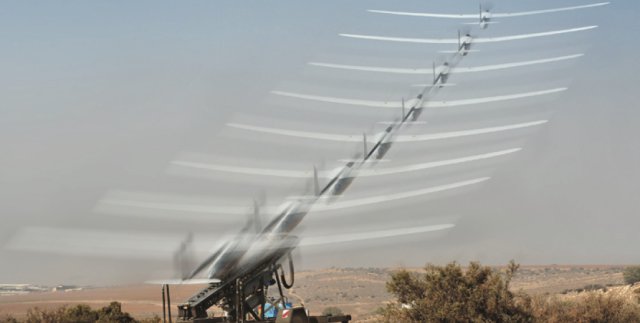 The Israel Defence Force’s Artillery Corps “Sky Rider” Unit is preparing to deploy a new UAS which will introduce a significant improvement in its takeoff, flight and visual capabilities, transferring aerial footage of the situation directly to the battalion.
The Israel Defence Force’s Artillery Corps “Sky Rider” Unit is preparing to deploy a new UAS which will introduce a significant improvement in its takeoff, flight and visual capabilities, transferring aerial footage of the situation directly to the battalion.
The system comprises a new version of “Skylark”, the UAS operated by the Unit, and a new operating system called “Version 10”, which will be integrated within the Unit in the coming days.
The Israeli Ground Forces have specified an objective by which Sky Rider soldiers recruited in November 2012, whose dedicated training will commence this March, will be trained to operate the new version of the system. “The new version will be substantially better than the currently existing systems”, said Sky Rider Commander, Lt. Col. Uri Gonen. “Among other capabilities, it will provide a link between the new “Tamnoon” command and control (C2) system intended for the Unit and between the DAP (Digital Army Programme) system, thus enabling the “Sky Rider” system to continuously operate in the “Massuah” environment”, he added. Once attached to the DAP, battalion commanders will be able to pinpoint UAS location on their screens and determine the area it is observing.
In addition to the presently operated regimental UAS, the Unit is currently involved in the development of an additional UAS for the Brigade level, along with the Department of Military Equipment and the Israeli Ground Forces’ Technology Division, as well as the defense industries. The approval of the development of this new UAS follows a “Sky Rider” flight trial that was held between the months of November 2011 to March 2012, examining the operational need for such a UAS. “The aim is to create a force within the unit, platoon or company, which will operate in the brigade level”, explained Lt. Col. Gonen. This UAS will address more comprehensive visual needs suiting the activity of a brigade, as compared to a battalion, which examines a smaller area. “I believe that this UAS’ operational capabilities will be evident in the field within 18 months”, he added.
Source:Ba’Machane/IDF
